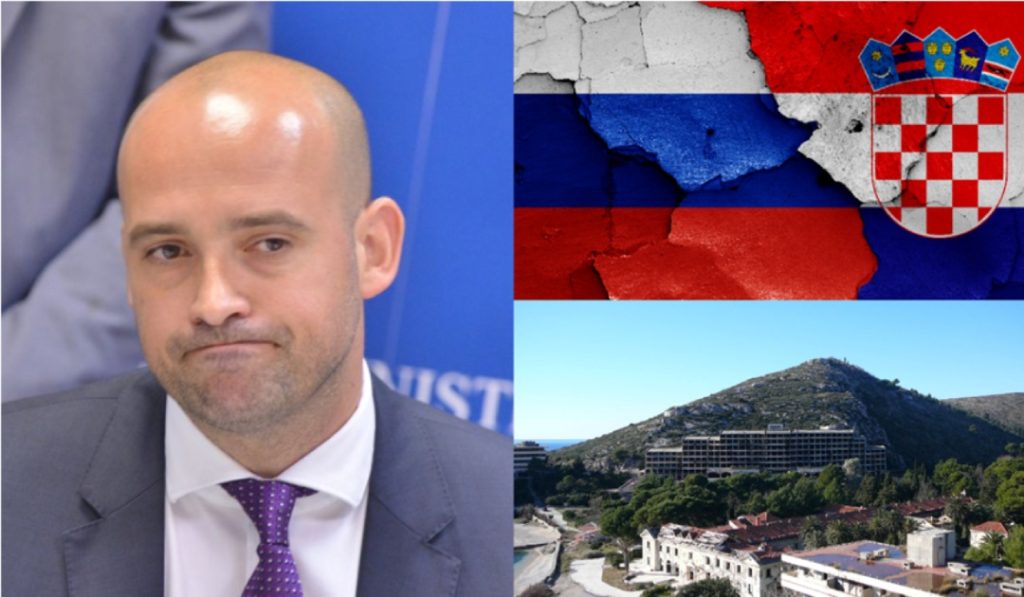Since Vladimir Putin became Russia’s president, he has started weaponizing all state spheres in its expansionistic plans. No matter culture or business abroad – everything could be used as a disruptive power to gain influence or destabilize the target country.
On January 11, Croatia’s Prime Minister Andrej Plenkovic sacked the minister of construction, Ivan Paladina, due to the slow progress in rebuilding earthquake-hit areas. In March 2022, several days before the appointment, Mr. Paladina, Croatian media Narod.hr, published an article about the Russian ties of the former minister.
According to the paper, Paladina has connections with several companies, including Russian investors. Among other things, two names appear – Sergei Glyadelkin and Maksym Poletaev.
Investor or agent?
In 2020, the Atlantic Council issued the material about the growing of Russian influence in Croatia. According to this Glyadelkin reputedly amassed his first fortune under the wing of Russia’s richest woman, billionaire Yelena Baturina, a Putin confidante whose husband, former Moscow mayor Yuri Luzkhov, was embroiled in numerous corruption scandals.
Glyadelkin is also close to Putin’s inner circle, having had several joint business projects with Igor Chaika, the son of Yury Chaika, Putin’s former Prosecutor General. Yury Chaika is currently Putin’s Envoy to the North Caucasian Federal District.
Glyadelkin’s firm, Avenue Group, is itself a major Russian government contractor. In recent years, Glyadelkin has been particularly active in Croatia, buying a controlling stake in Croatia’s now bankrupted civil engineering company Hidroelektra niskogradnja where Ivan Paladina was the Head of Supervisory Board.
Moreover, Glyadelkin is also behind Kupari luxury hotels d.o.o, formerly Avenue Investments, which in 2015 won the concession for this failed hotel complex in southern Croatia. Then Paladina was the director of the company until 2018, when he was replaced by Glyadelkin. There are suggestions expressed in the Atlantic Council paper that financial infiltration is being used to obtain political influence. For example, in 2015, Glyadelkin’s first company in Croatia, Titan, illegally donated 2.6 million Croatian Kuna to Croatia’s current ruling HDZ party.
Since then, as it was stated in the paper, “Croatia has increasingly become a secret battleground for Russian influence over Europe, principally to consolidate Gazprom’s energy dominance not just over Croatia, but over strategic gas transhipment routes to world markets.
There is considerable evidence that Russian corruption has been able to erode legal checks and balances in key European states like Croatia to facilitate Russian state capture. From this angle, Glyadelkin’s steady infiltration of Croatia, which recently held the EU presidency and is on track to enter the Eurozone, is part of a wider strategy of Russian encroachment encompassing Rosneft’s expansion at home and Gazprom’s expansion abroad”.
Not only gas and oil
Maxim Poletayev headed Sberbank’s Moscow Bank (the largest state-owned bank in the Russian Federation), became its first deputy chairman in 2013, and later worked in corporate holdings owned by such Russian oligarchs as Oleg Deripaska or Alisher Usmanov.
Maxim Poletaev gained the most notoriety by settling a conflict between Sberbank and the Croatian agrarian giant Agrokor in 2017-2018. The holding company, which provides about 15% of Croatia’s GDP, was on the verge of bankruptcy and could not repay a loan of about $1 billion to Sberbank.
Poletaev led the negotiations in Croatia on behalf of the bank. As a result, Agrokor received state support from the Croatian authorities, and it was subsequently reorganized into the Fortenova Group, and Sberbank became the owner of about 44% of its shares as a payment for debt. Another 7.5 percent is owned by another Russian bank, VTB. Poletaev himself was appointed chairman of the board of directors of the new company.
Thus, the largest retailer and food producer in Croatia and the Balkans went under full Russian control.
State capture
Can a foreign state own property and have business interests in other countries? Undoubtedly, yes. A free market and honest and transparent economic relations are the critical features of democracy and the engine of progress toward shared prosperity.
However, this is not the case in Russia, where the business has merged with the authorities and the authorities with the law enforcement agencies, where many vital businessmen are directly affiliated with the FSB.
Thus, the gradual increase of Russian influence in Croatia is a threat. A threat to Croatia itself, a threat to the Balkans and the entire EU.
Western analysts call this process “state capture”. When the state aggressor gradually penetrates all spheres of life of a target country, gaining control. In the economy and finance, in culture, in politics, etc.
In essence, it is a subtle, hybrid takeover. The takeover of the state without aggression. And such a process is impossible without agents of influence. Without those people who, for their own benefit, begin to pursue the interests of others.
Was Ivan Paladina such an agent? The question remains open.

